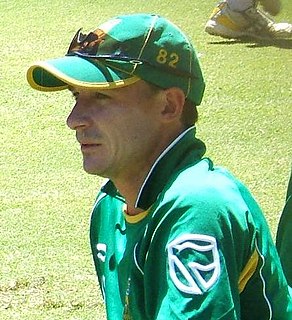A Quote by Bob Hawke
It had things that it could do and which I thought were worthwhile: one would be South Africa, of course. And, as I said, I assumed a leadership role within the Commonwealth on that.
Related Quotes
The concept there was that the small number of developed countries within the Commonwealth should provide assistance. This was not just financial but personal, providing experts and so on, to assist less developed members of the Commonwealth to get on the growing path. And that was part of what we did with South Africa.
A number of African countries came to us and said, we request that South Africa should not field a candidate, because so many other African countries wanted to, and, in any case, South Africa would continue to play a role in terms of building the African Union, and so on. And they actually said, please don't field a candidate, and we didn't. As I have said, it is not because we didn't have people who are competent to serve in these positions.
One other thing: at the meeting in Canada, [there was] the coup in Fiji. This comes to an important part of the Commonwealth: the role of the Queen [Elizabeth II]. I had absolutely just enormous respect for her as leader of the Commonwealth. You could talk to her about any of the fifty-one countries of the Commonwealth and you could have an intelligent conversation with her about the economics, the politics. She really immersed herself in the Commonwealth.
We were land-based agrarian people from Africa. We were uprooted from Africa, and we spent 200 years developing our culture as black Americans. And then we left the South. We uprooted ourselves and attempted to transplant this culture to the pavements of the industrialized North. And it was a transplant that did not take. I think if we had stayed in the South, we would have been a stronger people. And because the connection between the South of the 20's, 30's and 40's has been broken, it's very difficult to understand who we are.
And now South Africa has finally woken up and it is doing great things. And if South Africa becomes the template to what AIDS is in the sub-Saharan continent, then all the other countries are going to follow suit. And Michel Sidibe, who spoke at the breakfast meeting this morning, was saying that there is so much hope for Africa now that South Africa has got its house in order.
It [also] lives on its history, now, to some extent: its achievements [ of the Commonwealth] in Rhodesia and South Africa, which were enormous. And they'll live on that for some time, I guess. And there is still - I'm out of touch with it now, of course - but I still think there is a degree of cooperation at the economic level, to some extent, with the more developed countries helping the less developed. How substantial that is now, I simply am not versed.
South Korea from a country that had relatively little primary education became close to universal literacy in the course of 25, 30 years, in a way trying to replicate what Japan had done earlier. They were learning to some extent from the Japanese experience too. So I think, in a sense, the East Asians were following a path, which all other countries including South Asia could follow but chose not too.
One white man on the platform in South Carolina asked us where we were going--we had got off the train to get some fresh air and to dust the grit and dust out of our clothes. When we said Africa he looked offended and tickled too. Niggers going to Africa, he said to his wife. Now I have seen everything.







































